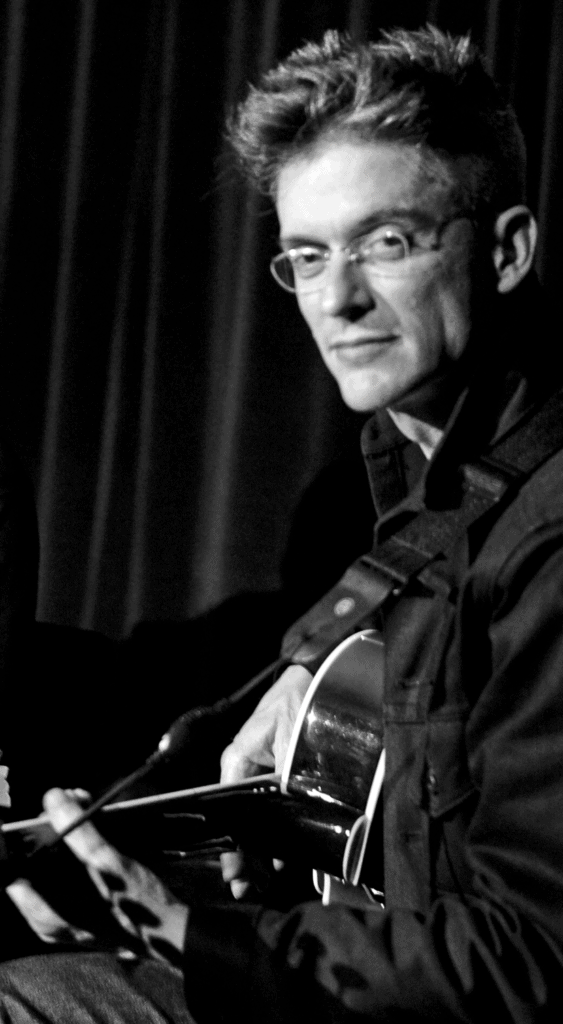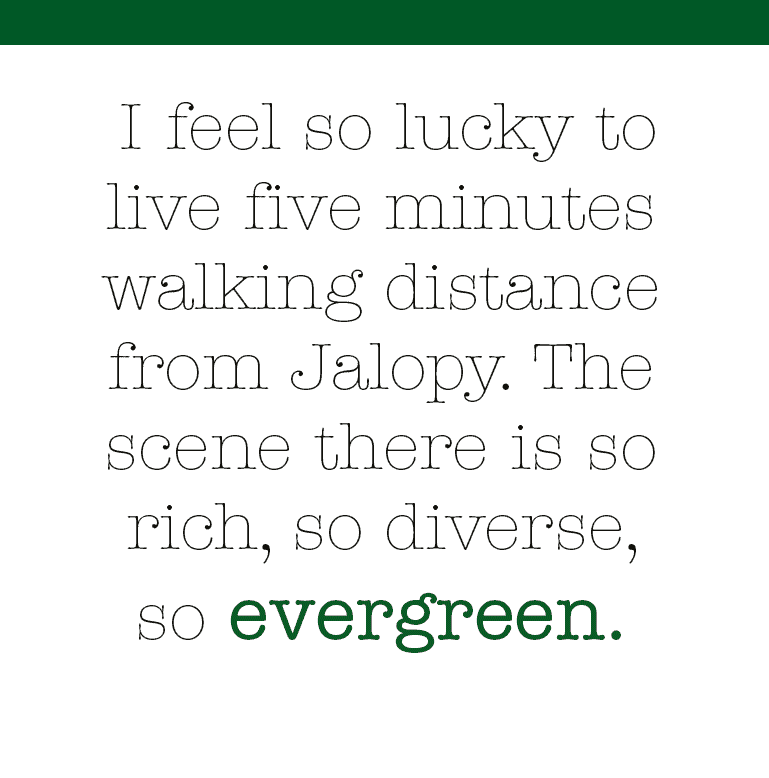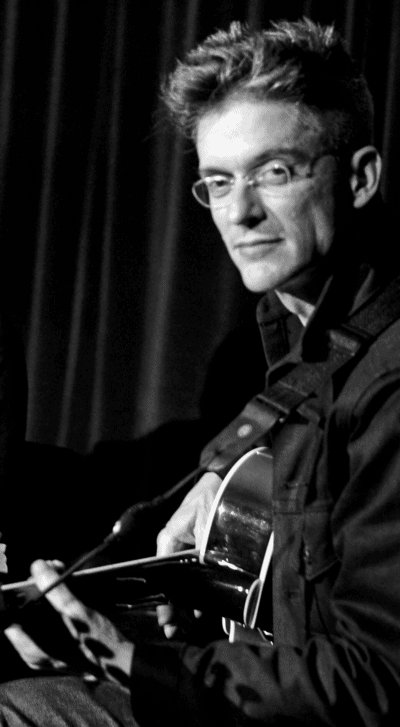
The peaceful brownstone blocks of Brooklyn frequently hide a staggering amount of talented characters. We are often surrounded by unusual people and don’t even know it. As a musician and a writer, I am intrigued by those who should be better known but aren’t. One such fellow is singer-songwriter-guitarist Matt Statler.
Originally hailing from St. Louis, Missouri, Statler’s Americana sound is rooted in country, blues, and folk. The structural simplicity of his music provides a platform for ideas that range from love to the apocalyptic effects of climate change. His songs are cerebral, soulful, and generally optimistic, but occasionally veer into darker realities.
Statler sometimes performs solo under the name of Campbell’s Atlas, a composite of his middle name and the fact that his family wrote the first geographic survey of the state of Missouri. He also leads the “hip-neck” country rock group The Bootheel Boss Gobblers and forms one half of The Sons of Astro, a psychedelic folk duo. Though his sound is Americana, he used to front a thrash band that once opened up for punk pioneers Fugazi.
Statler is a scholar with a Ph.D. in Philosophy. His deep knowledge of these subjects seeps into his songwriting. You can catch him live most Tuesday nights at the Jalopy Theatre open mic and at select performances throughout Brooklyn. I reached him for interview by email.
RHSR: Did you grow up in a musical household?
MS: Yes. My mother studied piano and the church organ through college, and my father played the saxophone in the dance band at his own high school prom. We had a piano at home as well as some heavy Japanese stereo equipment that my dad had bought in Tokyo while on shore leave during the Vietnam War. There was always music playing or being played when I was a kid.
RHSR: How did you begin playing music?
MS: My two brothers and I all took piano lessons as kids, and we went to a Lutheran grade school where everybody sang in the choir every day. When it was time to join the symphonic band in junior high, I chose the trumpet and was pretty serious about it, going to summer band camp at Southeast Missouri State University for six years.
RHSR: Who are some of your major influences?
MS: My early influences derive from my parents’ record collection, which was anchored by the Newport Folk Festival box sets and included lots of Simon & Garfunkel, Bob Dylan, Donovan, and early folk rock. There was a good bit of cool jazz and plenty of Broadway on the turntable as well. But the first album that I bought for myself was by Waylon Jennings. I have so many memories of riding in the back seat of our van on winding Ozark roads listening to Willie Nelson, Kenny Rogers, Johnny Cash, Hoyt Axton – the outlaw country ethos was indigenous to that part of the country.
Of course, classic rock like Led Zeppelin and Black Sabbath was everywhere in the air. My first real vision of another horizon was when I encountered hip-hop on a radio station out of St. Louis, and I got into Run D.M.C, Whodini, Newcleus, groups like that. After that in high school my friends and I started listening to punk rock, and we formed a thrash band that carried us into college when we were lucky enough to open up for Fugazi. After college I moved to Nashville and rediscovered American roots music, and that’s basically what I’ve been playing and performing ever since.
RHSR: Your songs deal with ideas as wide ranging as love to the apocalyptic effects of climate change, sometimes with esoteric historical references to things like 16th century German poetry. Where do you get your ideas & how do you work them into your songs?
MS: For many years when I was looking for lyrical ideas I would go to the bookshelf, pull a random book and open it to a random page and start there. I was inspired by accidental approaches, found poetry, automatic writing and the like. So, my approach still involves getting myself, my own thoughts, my ego out of the way so that other ideas, other spirits can speak through me. Since having kids, I’ve felt obliged to edit lyrics so that they are appropriate for family singalongs, but that has forced me to work with double entendre and irony in ways that I’ve found productive.
RHSR: Can you tell me more about your songwriting process? What are some of your favorite original songs?
MS: I bike to work, and it’s about thirty minutes coming and going. I get most of my ideas during those intervals. I’m alone with my thoughts, I’m engaged in a rhythmic movement, and the sights and sounds of the city push me in all kinds of directions. Usually, I’ll get a little groove or melody in my head, and I’ll repeat it until it feels good. Then I’ll stop riding and use my phone to record myself singing the phrase. Then later at home I’ll play that recording, work out some chord changes, and play that while humming along, vocalizing sounds that later become lyrics.
The original tune that I would consider my ‘theme song’ is called Sweet Inertia, and it’s a riff on the folk classic Cornbread and Butterbeans, re-written in the voice of a tired but happy Brooklyn dad.
RHSR: What are some of the things on your mind today as a songwriter?
MS: We’re living in wild times, so I’m all over the place psychologically and emotionally. The other night onstage at Jalopy I joked that a friend had been giving me a hard time for only writing about death, so I tried for a while to write love songs, and then decided to split the difference and just write about the apocalypse. So, I’m trying to respond to the political and social dynamics of our time, while channeling deep and ancient vibes to wake people up and give them some hope.
RHSR: How does your work as a teacher influence your music?
MS: Professionally I’m a philosopher who teaches ethics and leadership at a business school, so I’m performing all the time. The music helps me connect with my students, while in turn the challenges they face give me plenty of inspiration for topical songs, protest songs.
RHSR: Tell me about your different musical projects.
MS: I’ve been writing songs and performing under the name Campbell’s Atlas ever since college. My middle name is Campbell, and when I was a kid whenever a question came up about Missouri geography my Grandma Statler would propose to “look it up in Campbell’s Atlas.” That was the name of the first geographic survey of the state, and it’s kind of a twisted anagram of my middle and last names, so it has served me well as stage identity.
Then a few years ago I was reading my hometown newspaper and there was an article about the local turkey hunters’ association, and they called themselves the Bootheel Boss Gobblers. I thought, man that’s a great name for a band, and then a week or so later I was watching a YouTube of Ray Wylie Hubbard speaking about how when Willie Nelson came to Austin back in the 70’s he was able to play music that allowed the hippies and the rednecks to hang out together. Apparently, they called it “hipneck” music. So, the Bootheel Boss Gobblers was born as a political art project, a musical collective playing hipneck music because now is a time in our country when the hippies and the rednecks need to learn how to hang out and have fun together again.

My most recent ensemble is called Sons of Astro, and it was inspired when a guy showed up to one of our gigs with a couple of big dogs that started howling along in the chorus to a song. So, we asked the guy what’s up with the dogs? and he said they were named Cosmo and Retro, and they were 100% cloned from DNA from their father, Astro. After Tom Petty died, we had been playing lots of cosmic Americana, and we thought that Sons of Astro was a great name for a harmony-driven folk-rock duo.
RHSR: What are some of your goals for the future as a musician?
MS: I’ve never really had the patience or the money to sit down and record my music properly. It always just seems like more fun to keep playing rather than stop and put on headphones or look at a screen. But I’ve written seventeen songs in the past year, and there’s a lot more in the back catalog. So, my goal for the future is to be more diligent about producing and distributing my music, starting with the stuff that’s up on SoundCloud, but hopefully going on to record a proper album in a studio.
RHSR: Anything else you’d like to add?
MS: I feel so lucky to live five minutes walking distance from Jalopy. The scene there is so rich, so diverse, so evergreen. And while the festivals and touring headline acts are consistently top-notch, I also really like the amateur feeling of the open mic, the slow jam, the classes and workshops. It’s a folk art that we’re cultivating, and sometimes when people are stretching themselves to perform it can transcend beauty and become sublime.
To hear some of Statler’s remarkable songs, look for him live at Jalopy’s Tuesday night open mic and check him out online at www.soundcloud.com/campbells-atlas
Mike Cobb is a Brooklyn based musician, writer, and multimedia producer. Check him out online at www.mc-obb.com










